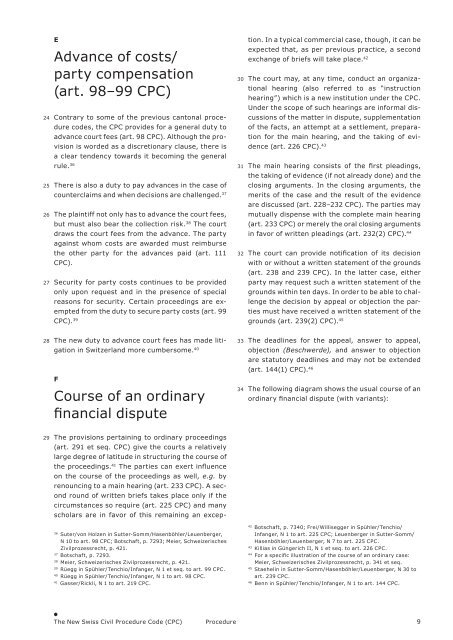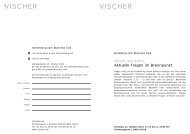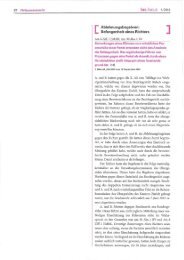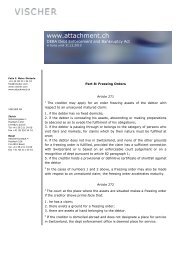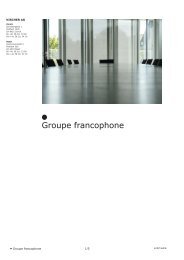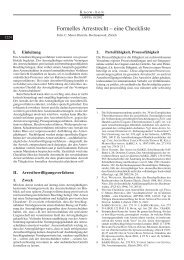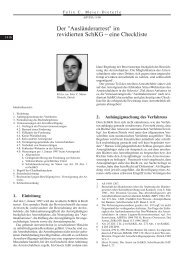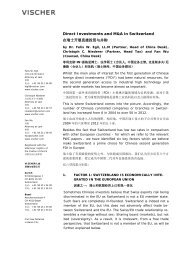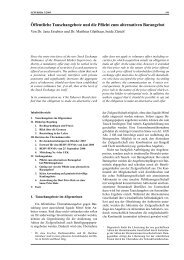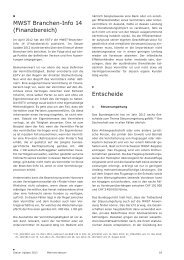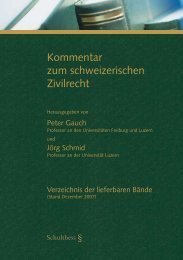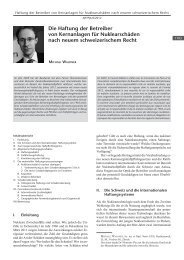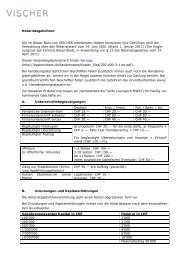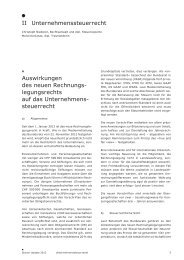The New Swiss Civil Procedure Code (CPC) - Vischer
The New Swiss Civil Procedure Code (CPC) - Vischer
The New Swiss Civil Procedure Code (CPC) - Vischer
Create successful ePaper yourself
Turn your PDF publications into a flip-book with our unique Google optimized e-Paper software.
E<br />
Advance of costs/<br />
party compensation<br />
(art. 98–99 <strong>CPC</strong>)<br />
24 Contrary to some of the previous cantonal proce-<br />
dure codes, the <strong>CPC</strong> provides for a general duty to<br />
advance court fees (art. 98 <strong>CPC</strong>). Although the pro-<br />
vision is worded as a discretionary clause, there is<br />
a clear tendency towards it becoming the general<br />
rule. 36<br />
25 <strong>The</strong>re is also a duty to pay advances in the case of<br />
counterclaims and when decisions are challenged. 37<br />
26 <strong>The</strong> plaintiff not only has to advance the court fees,<br />
but must also bear the collection risk. 38 <strong>The</strong> court<br />
draws the court fees from the advance. <strong>The</strong> party<br />
against whom costs are awarded must reimburse<br />
the other party for the advances paid (art. 111<br />
<strong>CPC</strong>).<br />
27 Security for party costs continues to be provided<br />
only upon request and in the pres ence of special<br />
reasons for security. Certain proceedings are ex-<br />
empted from the duty to secure party costs (art. 99<br />
<strong>CPC</strong>). 39<br />
28 <strong>The</strong> new duty to advance court fees has made liti-<br />
gation in Switzerland more cumber some. 40<br />
F<br />
Course of an ordinary<br />
financial dispute<br />
29 <strong>The</strong> provisions pertaining to ordinary proceedings<br />
(art. 291 et seq. <strong>CPC</strong>) give the courts a relatively<br />
large degree of latitude in structuring the course of<br />
the proceed ings. 41 <strong>The</strong> parties can exert influence<br />
on the course of the proceedings as well, e.g. by<br />
renouncing to a main hearing (art. 233 <strong>CPC</strong>). A sec-<br />
ond round of written briefs takes place only if the<br />
circumstances so require (art. 225 <strong>CPC</strong>) and many<br />
scholars are in favor of this remaining an excep-<br />
36 Suter/von Holzen in Sutter-Somm/Hasenböhler/Leuenberger,<br />
N 10 to art. 98 <strong>CPC</strong>; Botschaft, p. 7293; Meier, Schweizerisches<br />
Zivilprozessrecht, p. 421.<br />
37 Botschaft, p. 7293.<br />
38 Meier, Schweizerisches Zivilprozessrecht, p. 421.<br />
39 Rüegg in Spühler/Tenchio/Infanger, N 1 et seq. to art. 99 <strong>CPC</strong>.<br />
40 Rüegg in Spühler/Tenchio/Infanger, N 1 to art. 98 <strong>CPC</strong>.<br />
41 Gasser/Rickli, N 1 to art. 219 <strong>CPC</strong>.<br />
<br />
<strong>The</strong> <strong>New</strong> <strong>Swiss</strong> <strong>Civil</strong> <strong>Procedure</strong> <strong>Code</strong> (<strong>CPC</strong>) <strong>Procedure</strong><br />
tion. In a typical commercial case, though, it can be<br />
expected that, as per previous practice, a second<br />
exchange of briefs will take place. 42<br />
30 <strong>The</strong> court may, at any time, conduct an organiza-<br />
tional hearing (also referred to as “instruction<br />
hearing”) which is a new institution under the <strong>CPC</strong>.<br />
Under the scope of such hearings are informal dis-<br />
cussions of the matter in dispute, supplementation<br />
of the facts, an attempt at a settlement, prepara-<br />
tion for the main hearing, and the taking of evi-<br />
dence (art. 226 <strong>CPC</strong>). 43<br />
31 <strong>The</strong> main hearing consists of the first pleadings,<br />
the taking of evidence (if not already done) and the<br />
closing arguments. In the closing arguments, the<br />
merits of the case and the result of the evidence<br />
are discussed (art. 228–232 <strong>CPC</strong>). <strong>The</strong> parties may<br />
mutually dispense with the complete main hearing<br />
(art. 233 <strong>CPC</strong>) or merely the oral closing arguments<br />
in favor of written pleadings (art. 232(2) <strong>CPC</strong>). 44<br />
32 <strong>The</strong> court can provide notification of its decision<br />
with or without a written statement of the grounds<br />
(art. 238 and 239 <strong>CPC</strong>). In the latter case, either<br />
party may request such a written statement of the<br />
grounds within ten days. In order to be able to chal-<br />
lenge the decision by appeal or objection the par-<br />
ties must have received a written statement of the<br />
grounds (art. 239(2) <strong>CPC</strong>). 45<br />
33 <strong>The</strong> deadlines for the appeal, answer to appeal,<br />
objection (Beschwerde), and answer to objection<br />
are statutory deadlines and may not be extended<br />
(art. 144(1) <strong>CPC</strong>). 46<br />
34 <strong>The</strong> following diagram shows the usual course of an<br />
ordinary financial dispute (with variants):<br />
42 Botschaft, p. 7340; Frei/Willisegger in Spühler/Tenchio/<br />
Infanger, N 1 to art. 225 <strong>CPC</strong>; Leuenberger in Sutter-Somm/<br />
Hasenböhler/Leuenberger, N 7 to art. 225 <strong>CPC</strong>.<br />
43 Killias in Güngerich II, N 1 et seq. to art. 226 <strong>CPC</strong>.<br />
44 For a specific illustration of the course of an ordinary case:<br />
Meier, Schweizerisches Zivilprozessrecht, p. 341 et seq.<br />
45 Staehelin in Sutter-Somm/Hasenböhler/Leuenberger, N 30 to<br />
art. 239 <strong>CPC</strong>.<br />
46 Benn in Spühler/Tenchio/Infanger, N 1 to art. 144 <strong>CPC</strong>.<br />
9


